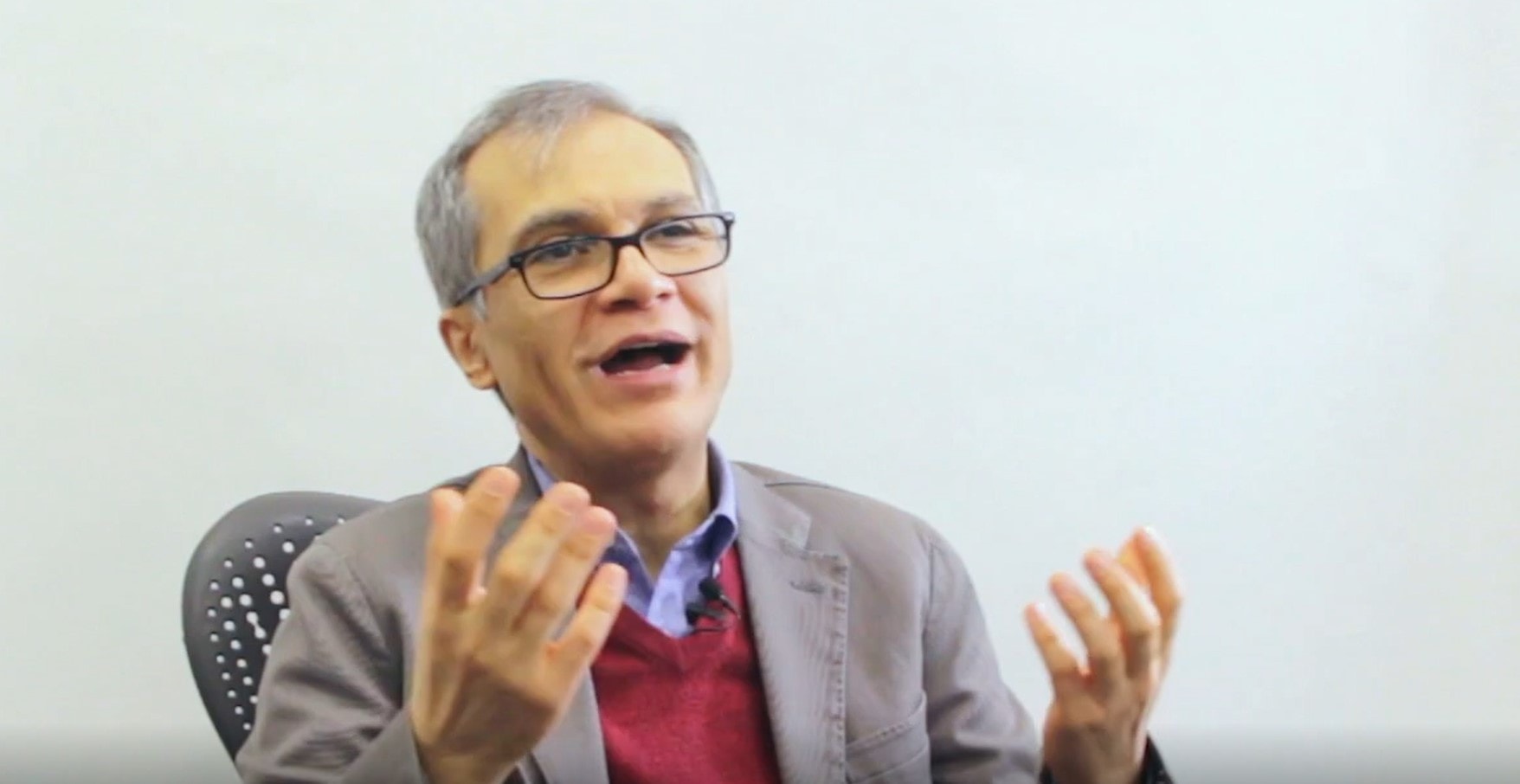>
“The Greeks said that memory is the mother of the muses. And I believe that a student is at the time of feeding that memory enormously and should do so with all possible muses.”
Pablo Boullosa, writer, educator and journalist, talks with the Observatory about the power of curiosity in education and the value of clarity in communication.
Observatory (O): What is the importance of curiosity in education?
Boullosa (B): Curiosity is like a spring that pushes you to know more things, to see beyond, further, to not conform. Therefore, curiosity was also persecuted as a vice, and that is why curiosity despairs parents. But it is very natural, it is a natural desire to know and that natural desire is something we can not lose, we should never lose. No matter how much you know a teacher or a specialist in your subject, in your topic, there are always new things. Everything is prospering; everything is changing. There is always more depth in which one can go looking. These borders are very attractive, we promote them.
My teacher, Kieran Egan, has a program that has been implemented in many parts of Canada, in the United States, in Europe, in Japan, in Chile, and it was recently implemented in a school in Mexico City. It is an in-depth education program. What is behind Kieran Egan’s idea is that curiosity is essential and is a value that we should take advantage of and promote in education.
A society can only find stability when, let’s say, somehow, it controls its most disruptive forces such as curiosity or love, which are potentially tremendous. I give you an example: even in the most liberal democracies, high-level political negotiations usually take place without anyone seeing them. We are curious to know what this meeting of the British Prime Minister is about with her Minister of Commerce, but they are done behind doors. Why? Because it is a way of controlling too, of giving stability to a process. And there are elements where curiosity is good but sometimes you have to limit its scope. It is a way of controlling a society.
Love is another enormously disruptive force, love and sexuality. And what have we invented? Marriage, the traditional marriage that gives us stability. A society to be alive needs those refreshing, disruptive impulses, but it also needs impulses of stability if we do not end up in chaos.
O: What do you think is the indifference that many students feel toward arts, literature, and philosophy?
B: What stories are told, for example, about philosophy or poetry socially? What is understood in Mexico, and many other places? That philosophy is useless. I do not know, nobody knows, about a successful philosopher in Mexico. Poetry? If it is not accompanied by music, then what is that? It does not exist, or it is useless. Poets are starving; they are junkies. These are the stories we tell about these things. It’s not surprising that the feelings we have towards these things are feelings of indifference or feelings that are plainly negative. How do we retell them?
Poetry, effectively, does not serve to raise houses or to make money but it has an essential human function. But you have to retell it; you have to tell it well, if not it will continue to be despised. So it has to do with the meaning we give to those matters and the meaning has always to do, I insist, with a narrative.
O: How can the Spanish language improve education in Latin America?
B: How can we judge what another person thinks? Only by how they articulate. We can not get into the heads of others and see if they are smart or stupid. We can only judge by how that thought is expressed. And when it is not expressed in a clear way, or when it is expressed in a confused, obscure, diffuse way, then we assume that these people do not have clear thoughts. It is natural. I think that too.
Moreover, when I do not understand something, then I start being more confused in my explanation. It happens to us all. When you do not understand something very well, then you try to understand it while you are talking, and you are chasing the meaning. So, by an accurate explanation, let’s be clear, I do not mean flamboyant words or having proper spelling. Phrasing is much more important; the syntax is much more important than grammar. Why?
Orally, if you express yourself clearly, it is clearly understood. I’m not going to judge if what you told me was well written; I won’t judge if what you said was “ball” and was written with “b” or “v.” I will listen to you and discern if I understand your idea. It is also a courtesy that you have with others. In teaching, it is absolutely essential. In the teaching-learning process, if the teacher does not explain well, how are you going to pretend that it was understood? That they understood it well, that they understood what they meant but did not say. Clarity in reading and writing is really important.
A subject that is published in many sources is how Amazon, a great technology company, works. I mean, Amazon board meetings. Even though Amazon has sold Kindle electronic readers and all, the board meetings are always the same. Before the meeting, an executive has to have a proposal, and the meeting has a reason. An executive is asked to write his proposal, and he has to write it clearly. He is not going to present it using PowerPoint, he is going to write it, and in the first ten or 15 minutes of a meeting, he has to read that proposal on paper. No, he does not read it on the iPad; he reads it on paper. What Jeff Bezos knows perfectly is that understanding is crucial when you use paper and pen; you can cross out and point right there on paper. It is written on paper, and an executive has to express it on paper. That’s when Jeff Bezos realizes whether his executives think clearly or not. If the guy does not write well, then he does not think well. Sorry, that’s the way it is, and that’s the way it is in the big technology companies. The same thing happens at Intel.
It is an essential task of a good executive to write well, to express his ideas well, with clarity, that everyone understands. To be economical, not waste time reading pages and pages trying to know what this guy is telling us. Ortega y Gasset said that he aspired to clarity, to clarity in the transmission of his thoughts, and that is very important. This is the only way in which a Council can function, in which an executive can transmit instructions to his subordinates or in which a boss can share those instructions or raise petitions or raise problems.
O: Could you mention one book that every teacher should read?
B: For us teachers who speak Spanish, I believe that every teacher must read not a single book but several books by José Antonio Marina. José Antonio Marina is the most important educational philosopher of the Spanish language world, by far. You have to read books like: “La inteligencia fracasada,” “La teoría de la inteligencia creativa” his collection “Biblioteca de padres.” Teachers must read “La magia de leer,” “La magia de escribir,” “El misterio de la voluntad perdida.” So I think that I’m not going to answer a single book but an author that all teachers in the Spanish language have to read.
Marina is not only an original thinker, but he also makes a grand synthesis of contemporary educational thought. So, nobody has read, I think, more books on education, nobody has transmitted them to us in such a complete synthesis like him.
O: What are the books that you recommend to university students?
B: Well, I believe that every university student should read many books. I also do not dare to say one book, but many books. Moreover, it must be forced to read different genres. Some students like historical novels, so they get stuck with historical novels. Some students who love Bukowski are stuck with Bukowski. I think it is important to read books of different genres, from different periods, from various authors, books written in Spanish, books translated into Spanish because they all enrich the life of a student.
We all remain to be students in a sense throughout our lives. A student is at the time of her life in which she must feed his spirit with many things. That is what will serve her later to stand out. The Greeks said that memory is the mother of the muses. And I believe that a student is at the time of feeding that memory enormously and should do so with all possible muses. They must have good experiences.
Literature is always a vicarious experience; books offer us their vicarious experience: I was not there, but the author either imagined it, was there, transmitted it to me, lived it, or experienced it in some way, and I can acquire that experience even though my life is constricted to a house, a school or a city. I can obtain incredible experiences from any other country. I can get in touch with the best minds of all times and all languages.
It’s the ideal age to feed on a lot of things. You do not know what an important book can serve you at age 18 that has nothing to do with your profession, nothing to do with anything useful or practical at that moment and it turns out that 20 or 30 years later that book is essential to you. That book opens a window, that book helps you explain something, it enables you to understand something deeply, to better understand what is happening to you 30 or 40 years later. It happens. It is a moment, like all education, to invest in your future and books are part of that investment for your future.
This article from Observatory of the Institute for the Future of Education may be shared under the terms of the license CC BY-NC-SA 4.0 
)
)










)
Paulette Delgado
Paulette Delgado
Paulette Delgado